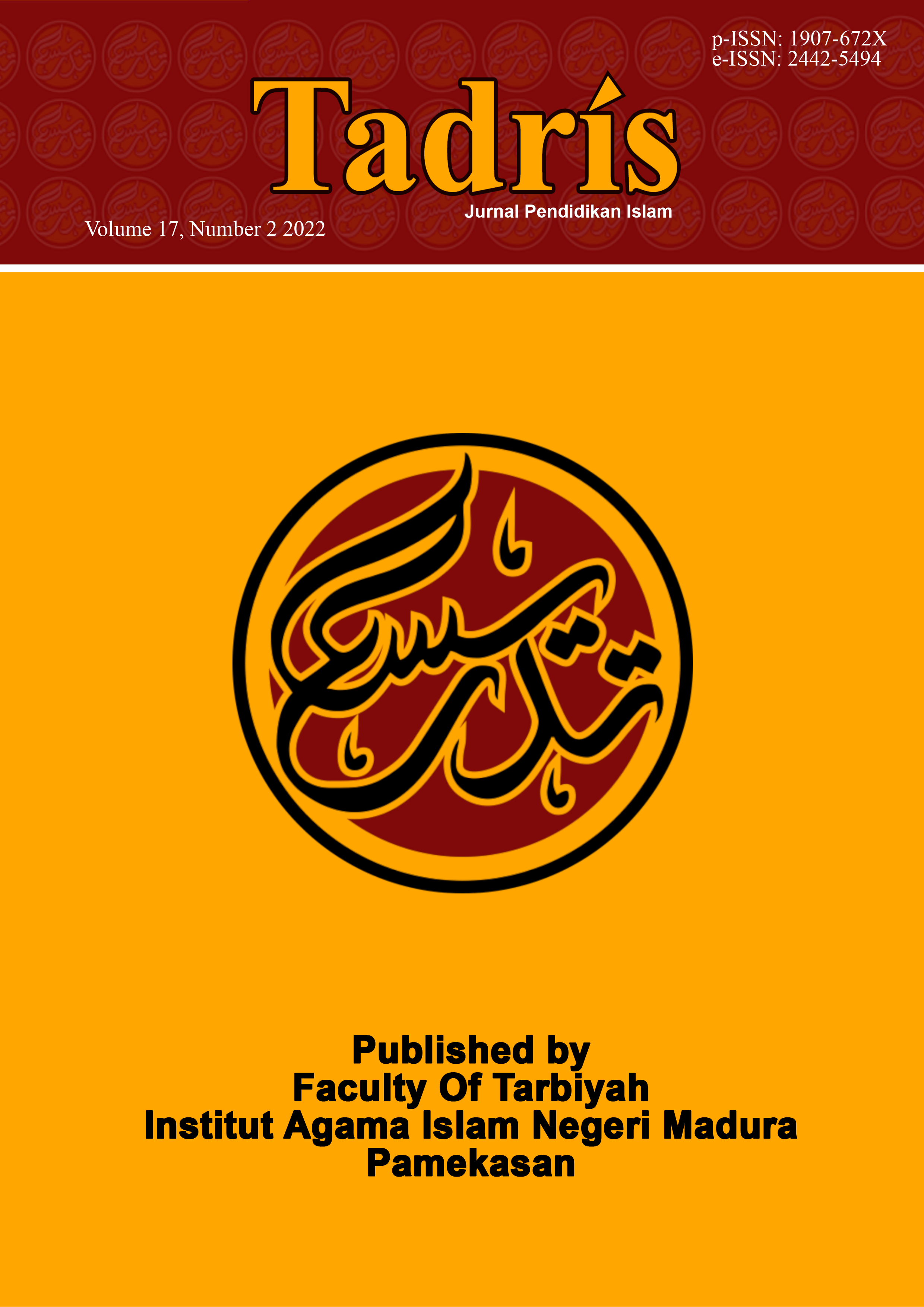The Educational Epistemology Of Traditional Pesantren
 Abstract views: 436
,
Abstract views: 436
,
 PDF downloads: 239
PDF downloads: 239
Abstract
This study aims to explore the reasons al-Maqbul pesantren maintains the traditional education system in the educational epistemology perspective. This research is qualitative, describe data obtained from the field and literature related to the discussion. To get the data used data collection techniques through observation, interviews and documentation. This study resulted in the findings, namely: (1) The reason al-Maqbul pesantren maintains the traditional education system cannot be separated from the epistemological construction of education; (2) The influence of the epistemological foundation of education at the al-Maqbul pesantren on its educational goals can be identified from Bayani's tendency to place sources of knowledge instead of logical reasoning, empirical observations, and scientific methods. However, the texts of the Qur'an, Hadith, and the Yellow Book; (3) According to the view of al-Maqbul pesantren, truth, knowledge, and educational methods are obtained from the texts of the Qur'an, Hadith, and the Yellow Book. The conclusion of this study is that al-Maqbul pesantren still maintains the purity of its original identity as a place to study religious sciences for its students. All knowledge learned in this pesantren is entirely religious in nature, sourced from Arabic-language books, does not include general knowledge in the education system.
Downloads
References
Broudy, Harry S. ‘How Philosophical Can Philosophy of Education Be?’ In What Is Philosophy of Education? London: MacMillan, 1969.
Hanafi, Hassan. Muqaddimah Fī Ilm Al-Istighrāb. Kairo: Dar al-Fanniyah, 1991.
Mas’ud, Muh. Interview, 17 September 2021. Roudlatul Muhsinin al-Maqbul Pesantren Complex in Kuwolu Bululawang Malang.
Morris, Richard Knowles. ‘The Philosophy of Education: A Quality of Its Own’. In Christopher J. Lucas (Ed). What Is Philosophy of Education? London: MacMillan, 1969.
Muhsin, Chudlori. Wawancara. Majelis Masyayikh Pesantren al-Maqbul, 11 March 2021. Pondok Pesantren Salafiyah Roudlotul Muhsinin.
Muhsin, Luqman. Interview. Majelis Masyayikh al-Maqbul Islamic Boarding School, 25 September 2021. Roudlatul Muhsinin al-Maqbul Islamic Boarding School Complex in Kuwolu Bululawang Malang.
———. Wawancara. Majlis Masyayikh Pesantren al-Maqbul, 25 September 2021. Ndalem Kompleks Pondok Pesantren Roudlatul Muhsinin al-Maqbul Kuwolu Bululawang Malang.
Muhsin, Muhtadin. Wawancara. Majelis Masyayikh Pesantren al-Maqbul, 11 March 2021. Pondok Pesantren Salafiyah Roudlotul Muhsinin.
Muhsin, Su’adi. Interview, 15 November 2021. Roudlotul Muhsinin al-Maqbul Pesantren in Kowulu Bululawang Malang.
Mulkhan, Abdul Munir. ‘Filsafat Tarbiyah Berbasis Kecerdasan Makrifat’. Jurnal Pendidikan Islam 2, no. 2 (2013): 219–39. https://doi.org/10.14421/jpi.2013.22.219-239.
———. ‘Manajer Pendidik Profetik Dalam Konstruksi Kesalehan Makrifat’. Manageria: Jurnal Manajemen Pendidikan Islam 1, no. 1 (2016): 1–21. https://doi.org/10.14421/manageria.2016.11-01.
Muqorobin, Ahmad, and Usamah Abdurrahman. ‘The Internalization of Anti-Corruption Values as Hidden Curriculum in Gontor Educational System’. Nadwa: Jurnal Pendidikan Islam 15, no. 2 (2022): 191–216. https://doi.org/10.21580/nw.2021.15.2.9873.
Price, Kingsley. ‘Is a Philosophy of Education Necessary?’ In What Is Philosophy of Education? London: MacMillan, 1969.
Rahman, Wahidur. Interview. Board of Teachers of the Roudlatul Bayan Madrasah Diniyah, 13 June 2021. Office of the Roudlotul Muhsinin al-Maqbul Islamic Boarding School, Bululawang, Malang.
Rofi’i, Muhyiddin. Wawancara. Dewan Guru Madrasah Diniyah Roudlotul Bayan, 11 March 2021. Pondok Pesantren Salafiyah Roudlotul Muhsinin.
Sulton, Ahmad. ‘Filsafah Nusantara Sebagai Jalan Ketiga Antara Falsafah Barat Dan Falsafah Timur’. ESENSIA: Jurnal Ilmu-Ilmu Ushuluddin 17, no. 1 (2016): 17–28. https://doi.org/10.14421/esensia.v17i1.1275.
———. ‘Konstruksi Pendidikan Reproduksi Bagi Remaja Dalam Bingkai Pendidikan Islam’. JURNAL TRANSFORMATIF (ISLAMIC STUDIES) 5, no. 2 (2021): 113–30. https://doi.org/10.23971/tf.v5i2.3277.
———. ‘Kurikulum Pesantren Multikultural (Melacak Muatan Nilai-Nilai Multikultural Dalam Kurikulum Pondok Pesantren Sunan Drajat Banjarwati Paciran Lamongan)’. ULUL ALBAB Jurnal Studi Islam 16, no. 1 (2015): 1–20. https://doi.org/10.18860/ua.v16i1.2782.
Sulton, Ahmad, Sangkot Sirait, and Mahmud Arif. ‘The Educational Philosophy of Traditional Pesantren Roudlotul Muhsinin Al-Maqbul: Integrating Future Education Values’. Cendekia: Jurnal Kependidikan Dan Kemasyarakatan 1, no. 1 (2022): 33–48. https://dx.doi.org/10.21154/cendekia.v1i1.3821.
Ulum, Muammilul. Interview. Al-Maqbul Islamic Boarding School Administrator, 13 June 2021. Office of the Roudlotul Muhsinin al-Maqbul Islamic Boarding School, Bululawang, Malang.
Zohdi, Ahmad. ‘Islamic Scientific Epistemology in Al-Jabiri Perspective’. International Journal of Linguistics, Literature and Culture 3, no. 5 (2017): 26–35.
Copyright (c) 2022 TADRIS: Jurnal Pendidikan Islam

This work is licensed under a Creative Commons Attribution-NonCommercial 4.0 International License.
The journal operates an Open Access policy under a Creative Commons Non-Commercial 4.0 International license. Authors who publish with this journal agree to the following terms:
- Authors retain copyright and grant the journal right of first publication with the work simultaneously licensed under a
 Commons Attribution-NonCommercial 4.0 International License
Commons Attribution-NonCommercial 4.0 International Licensethat allows others to share — copy and redistribute the material in any medium or format, and adapt — remix, transform, and build upon the material.
- Authors are able to enter into separate, additional contractual arrangements for the non-exclusive distribution of the journal's published version of the work (e.g., post it to an institutional repository or publish it in a book), with an acknowledgement of its initial publication in this journal.
- Authors are permitted and encouraged to post their work online (e.g., in institutional repositories or on their website) prior to and during the submission process, as it can lead to productive exchanges, as well as earlier and greater citation of published work (see The Effect of Open Access).














